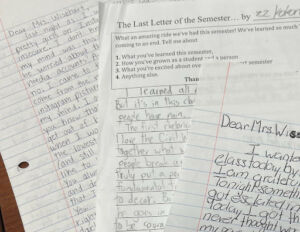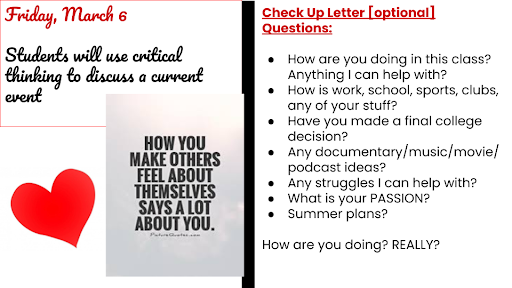As a writing teacher, it is easy to get caught up in all the “professional” and “academic” writing students need to accomplish. As an AP Language and Composition teacher, there is constant pressure to teach the three required essays in what seems like very little time!
“…what students learn in the classroom MUST be connected to their personal lives.”
But after 24 years in education, I continue to stand on this truth: what students learn in the classroom MUST be connected to their personal lives. They need to see the relevance of writing and how it will apply in the future. But even more importantly, writing teachers have an amazing opportunity to utilize writing in a way that will impact their relationships with students.
As a teacher, I have a few “rules” about the way my classroom operates in terms of relationships:
- In the first few weeks, every student (and myself) will know the name of every student in the room.
- In the first month, every student will have spoken to every student in the room.
- By the first few months, the students will begin to feel like a cohesive “family” – they will feel comfortable speaking in any small group.
- By the end of the semester, students will feel like they know something personal about every student in the room.
Since the bottom line in my classroom is safety – creating an environment that allows students room to take risks both personally and academically – the above “rules” are paramount to establishing this environment.
 There are many ways I accomplish these “rules”, and one of them is through Check-Up Letters. Once a quarter (or whenever necessary), I give students a good chunk of class time to write me a letter. I tell the students the PURPOSE of this letter is for me to get to know them better. Although the letter is personal and fun, it is a great way for me to learn about them as writers as well.
There are many ways I accomplish these “rules”, and one of them is through Check-Up Letters. Once a quarter (or whenever necessary), I give students a good chunk of class time to write me a letter. I tell the students the PURPOSE of this letter is for me to get to know them better. Although the letter is personal and fun, it is a great way for me to learn about them as writers as well.
I tell students to get out a blank sheet of paper. The first time I introduce this letter is most important, as I am establishing that no one is REQUIRED to tell me anything they don’t want to. It is crucial students understand the letter is private to only me (unless they write about harm to themselves or someone else) but they can feel free to express themselves in ways they might not be comfortable expressing themselves out loud.
This seems like a simple assignment – but countless students have positively responded to it. Many share that often, they don’t feel the teacher wants to hear what students are feeling or have to say. They don’t have an avenue to express concern or ask questions – especially those who don’t want to share out loud. It is also a great way for students to share parts of their lives the teacher might not know about.
On my daily Google Slides, I would include some optional questions students could answer for the letter, but there was never a “required” topic.

Students have written to me about everything from jobs to summer trips to past experiences in their English classes. Many of them ask questions about the current unit or let me know struggles they are having with assignments. One student even drew me a narwhal!
Once when I gave the first check-up letter of the year, a student asked me what the “record” was for the length of a letter. I told him the longest check-up letter I’d received was probably 5-6 pages.
That student took it as a challenge and hand wrote me a 20 page letter. It was a very enjoyable read that told me much of his life story. Through that letter, I learned this student was very creative and philosophical – which helped me guide him through the semester. In fact, he was a student who typically scored very low in English class – and the check-up letter was the gateway to a very successful year for him.
Of course, many teachers do a beginning of the year “survey” or journal entry – but the importance of this writing activity is the consistency, continuing to utilize this practice throughout the semester or year. If you need a resource to BEGIN the year, here is a letter assignment I have used in the past. Feel free to make a copy and make it your own!
Please keep these elements in mind when assigning this activity:
- DO NOT GRADE IT. This is a communication tool and relationship builder. Any sort of grade or participation will eliminate the purpose.
- DO NOT MARK GRAMMAR. I always tell students they don’t have to worry about spelling, punctuation, or proper grammar for this letter. They can have fun, draw, doodle, and let their personalities shine!
- MAKE SURE YOU HAVE TIME TO READ THEM. Students might tell you something very important – and if you don’t read them for some time, you could miss it. Make sure you assign the Check-Up Letter when you have time to read them immediately. I would often assign these letters on a Friday, giving myself the weekend.
- IF YOU CAN, RESPOND! When I assigned hand written letters, I always wrote a response to their questions or made a comment about the letter. When students emailed the letters, I always made sure to send them a short, timely (and personal) reply. This makes ALL the difference in relationship building.
This assignment has allowed me to cultivate relationships with all of my students, but it allows for students who may be more reluctant to speak up to share their own thoughts, passions, and dreams. They can express concern or just share about their families, jobs, or hobbies! More often than not, they will add that this assignment means a lot to them – because it means I care about them as PEOPLE, not just students.
“This assignment has allowed me to cultivate relationships with all of my students, but it allows for students who may be more reluctant to speak up to share their own thoughts, passions, and dreams.”
At the end of the semester, allow students to write one final letter (link here). At this point, they’ve written you several letters and they know the drill. It’s a great way to wrap up the semester or year and gather the good things that have happened as the students have grown. Students who choose to write surface level information can do so, and those who want to go deeper have that opportunity as well.
Regardless of the content, these check-up letters have helped me cultivate lasting relationships with my students that help them become better writers – and better humans.
Resources
Please login or register to claim PGPs.
Alternatively, you may use the PGP Request Form if you prefer to not register an account.



